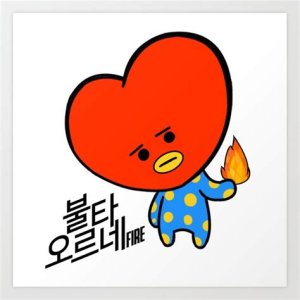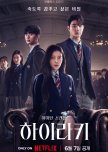Esta resenha pode conter spoilers
A Bland Blend of High School Drama and Unfulfilled Revenge
"Hierarchy" initially promises an intriguing blend of mystery, high school drama, and intricate character dynamics but ultimately falls short of its potential. The series struggles with pacing issues, lackluster character development, and a revenge plot that never fully comes to fruition.
One of the most significant issues with this drama is its inability to establish a clear identity. It attempts to blend elements from popular series like "Elite" with traditional kdrama tropes, but the execution is inconsistent. The show's tone oscillates between dark, gritty drama and lighter, more conventional high school scenes, creating a jarring viewing experience.
The central revenge plot, which could have been the driving force of the series, takes a backseat to less compelling storylines. Kang Ha's quest to uncover the truth behind his brother In-han's death is diluted by subplots involving superficial high school romances and power struggles that lack depth. Instead of focusing on the core mystery and building tension around it, the series meanders through trivial conflicts and repetitive interactions.
Character development is another area where this drama falters. The main leads, particularly Kang Ha and Jae-i, fail to evoke empathy or investment from the audience. Kang Ha, despite being positioned as the protagonist, is bland and one dimensional. His motivations are unclear, and his actions often feel inconsistent with his character. Jae-i, who is supposed to be a complex, conflicted figure, comes across as cold and detached. Her chemistry with Kang Ha is almost nonexistent, making their romantic scenes awkward and unconvincing.
Ri-an, another central character, shows some growth over the series, but his arc is not enough to salvage the show. His character's transformation from a typical bad boy to someone seeking redemption is poorly executed, and the final episodes' attempt to humanize him feels rushed and unearned. He-ra, on the other hand, stands out slightly better due to her strong performance, but even her character suffers from inconsistent writing and a lack of clear direction.
The supporting characters, who could have added layers to the narrative, are underutilized and poorly fleshed out. They serve more as plot devices than as integral parts of the story. This lack of depth makes it difficult to care about their fates or understand their motivations.
The show's pacing is another major flaw. The episodes are often padded with unnecessary scenes that do little to advance the plot or develop the characters. Key revelations and twists are either shown too early or dropped without sufficient buildup, resulting in a lack of suspense and engagement.
Visually, this drama has some redeeming qualities. The cinematography and production design are polished, capturing the opulence of Jooshin High and its surroundings effectively. However, good visuals alone cannot compensate for the weak narrative and character flaws.
The final episode attempts to wrap up the numerous plot threads but ends up feeling anticlimactic. The revelation of the true events behind In-han's death is predictable and lacks impact. The post-credit scene, intended as a cliffhanger, feels more like a desperate attempt to hook viewers for a potential second season rather than a satisfying conclusion to the story.
Overall, "Hierarchy" is a disappointing series that fails to capitalize on its intriguing premise. The acting, especially from the main leads, is subpar, and the writing does not do justice to the complex themes it tries to explore. With unlikable characters, a sidelined revenge plot, and inconsistent pacing, the series does not offer enough to make viewers care about the outcome.
One of the most significant issues with this drama is its inability to establish a clear identity. It attempts to blend elements from popular series like "Elite" with traditional kdrama tropes, but the execution is inconsistent. The show's tone oscillates between dark, gritty drama and lighter, more conventional high school scenes, creating a jarring viewing experience.
The central revenge plot, which could have been the driving force of the series, takes a backseat to less compelling storylines. Kang Ha's quest to uncover the truth behind his brother In-han's death is diluted by subplots involving superficial high school romances and power struggles that lack depth. Instead of focusing on the core mystery and building tension around it, the series meanders through trivial conflicts and repetitive interactions.
Character development is another area where this drama falters. The main leads, particularly Kang Ha and Jae-i, fail to evoke empathy or investment from the audience. Kang Ha, despite being positioned as the protagonist, is bland and one dimensional. His motivations are unclear, and his actions often feel inconsistent with his character. Jae-i, who is supposed to be a complex, conflicted figure, comes across as cold and detached. Her chemistry with Kang Ha is almost nonexistent, making their romantic scenes awkward and unconvincing.
Ri-an, another central character, shows some growth over the series, but his arc is not enough to salvage the show. His character's transformation from a typical bad boy to someone seeking redemption is poorly executed, and the final episodes' attempt to humanize him feels rushed and unearned. He-ra, on the other hand, stands out slightly better due to her strong performance, but even her character suffers from inconsistent writing and a lack of clear direction.
The supporting characters, who could have added layers to the narrative, are underutilized and poorly fleshed out. They serve more as plot devices than as integral parts of the story. This lack of depth makes it difficult to care about their fates or understand their motivations.
The show's pacing is another major flaw. The episodes are often padded with unnecessary scenes that do little to advance the plot or develop the characters. Key revelations and twists are either shown too early or dropped without sufficient buildup, resulting in a lack of suspense and engagement.
Visually, this drama has some redeeming qualities. The cinematography and production design are polished, capturing the opulence of Jooshin High and its surroundings effectively. However, good visuals alone cannot compensate for the weak narrative and character flaws.
The final episode attempts to wrap up the numerous plot threads but ends up feeling anticlimactic. The revelation of the true events behind In-han's death is predictable and lacks impact. The post-credit scene, intended as a cliffhanger, feels more like a desperate attempt to hook viewers for a potential second season rather than a satisfying conclusion to the story.
Overall, "Hierarchy" is a disappointing series that fails to capitalize on its intriguing premise. The acting, especially from the main leads, is subpar, and the writing does not do justice to the complex themes it tries to explore. With unlikable characters, a sidelined revenge plot, and inconsistent pacing, the series does not offer enough to make viewers care about the outcome.
Esta resenha foi útil para você?


 1
1






